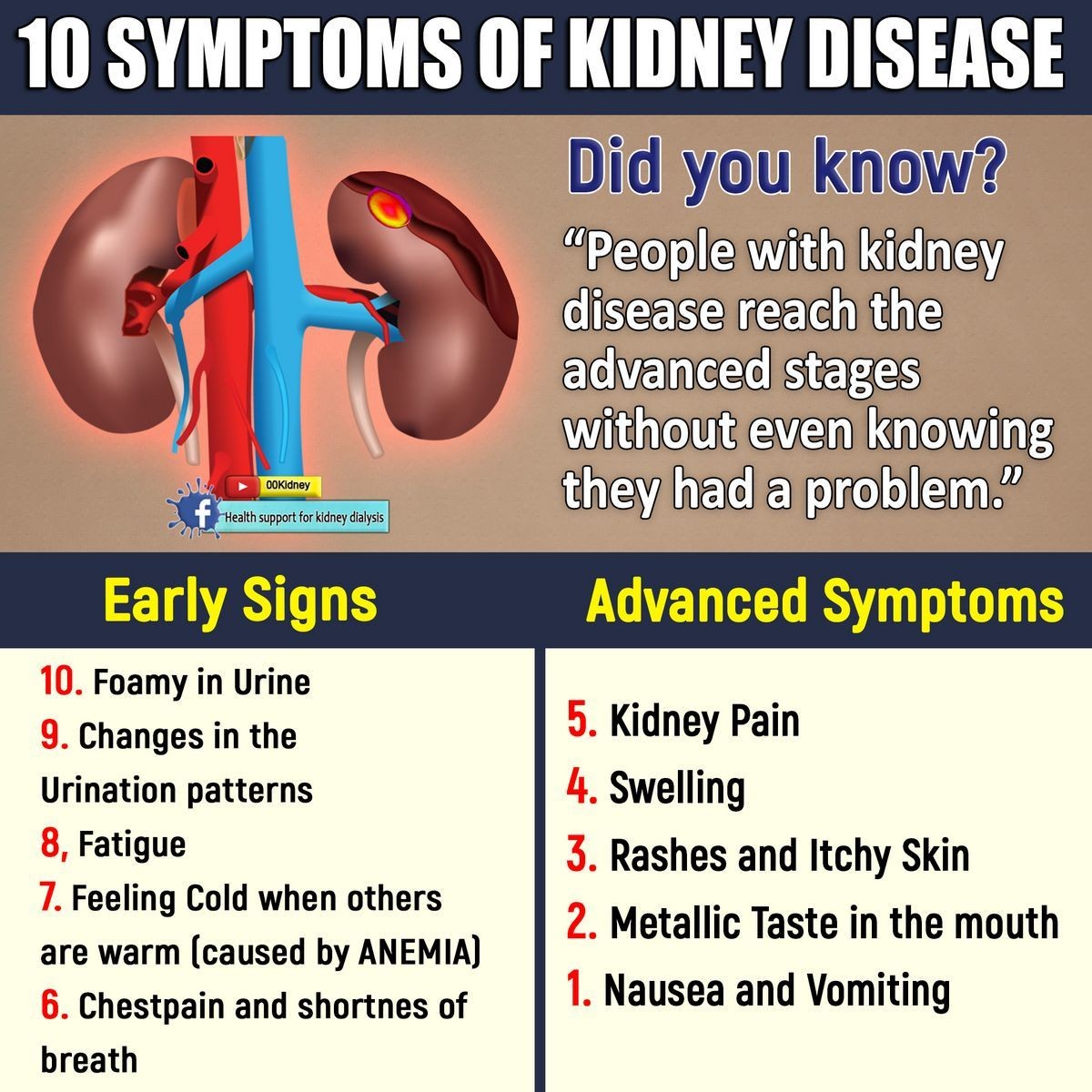
Contents
First Signs of Kidney Problems
Detecting and treating kidney problems promptly is crucial, so it’s important to be aware of the early warning signs.
Kidney disease can go unnoticed in its early stages since it has no symptoms. This means you could be unknowingly dealing with a life-threatening illness.
Look out for these early warning signs:
Early signs of kidney problems
- Increased urine output
- Decreased urine output
- Chronic fatigue
- Difficulty concentrating
- Dry, itchy skin
- Frequent urination
- Painful urination
- Foamy urine
- Dark-colored urine
- Persistent puffiness around the eyes
- Muscle cramps
- Sudden upper back or flank pain
- Lower back pain
Severe signs of kidney problems
- Fever with inability to urinate
- Blood in the urine
- Frequent smelly urinary tract infections
- Unresponsive high blood pressure
- Metallic taste in the mouth
- Shortness of breath
- Dizziness
- Weak immune system
- Ammonia-like breath
- Gum diseases
- Confusion
- Elevated blood sugar levels
- Nosebleeds
- Anemia
The kidneys filter between 120 to 150 quarts of blood daily, producing one to two quarts of waste. The waste is drained into the bladder for elimination through sweat, breath, urine, and bowel movements. Failure in any of these systems can have severe consequences.
Stages of kidney disease
Kidney disease has five stages:
- Stage I: Normal kidney function, with only a few mild symptoms. Urinalysis or blood work may reveal abnormalities, and high risk can be predicted based on genetics. Treatment may involve dietary changes and low-dose blood pressure medication.
- Stage II: Slightly impaired kidney function, with a few mild symptoms. Kidneys function between 60 and 89 percent of the time.
- Stage III: Possible symptoms include tiredness, swelling, appetite changes, dull back pain, changes in urine, and hypertension or digestive issues. Moderately reduced kidney function.
- Stage IV: Symptoms may include fatigue, swelling, appetite changes, back pain, changes in urine, hypertension, and slowed digestion. Severe chronic renal insufficiency with 15 to 29 percent kidney function.
- Stage V: End-stage kidney failure with 10 to 15 percent kidney function. Symptoms include itching, muscle cramps, nausea, loss of appetite, mental changes, fatigue, swelling, abnormal urine output, breathing difficulties, difficulty sleeping, and pain in the stomach or back. Dialysis or kidney transplant is required.
If you experience these symptoms, contact your doctor immediately as they could indicate kidney disease or life-threatening kidney failure.
Question
Types of kidney failure
Kidney failure can be classified into two types:
- Acute renal failure: Sudden failure of normally functioning kidneys. This may be reversible, but can leave the kidneys with irreversible scarring. Causes include trauma, severe blood pressure drop, infection, and various conditions.
- Chronic renal failure: A progressive, permanent kidney condition that develops from stage I to stage V, leading to end-stage renal disease. Causes include diabetes, high blood pressure, hereditary kidney disease, and other medical conditions.
Risk factors for kidney disease
Anyone can develop kidney disease, but certain factors increase the risk, such as:
- Exposure to environmental pollutants
- Medical conditions like heart disease, blood clotting disorders, kidney stones, and an enlarged prostate
- Infections, burns, and allergic reactions
- Dehydration
- Diabetes
- Age over 60
If you’re at risk, consult your doctor to determine the appropriate testing frequency. Early treatment by a kidney specialist can greatly reduce the severity of the disease. Take care of your kidneys by following instructions for over-the-counter medications, limiting alcohol intake, avoiding tobacco, drugs, pesticides, and toxins.
Treatment options for kidney disease
Treatment for kidney disease focuses on slowing or controlling the underlying cause, which varies depending on the individual case. Most kidney diseases are secondary to conditions like diabetes, high cholesterol, or high blood pressure.
Early detection and treatment of kidney diseases have a high success rate. Proper hydration, alkalinization of urine, medications like ACE inhibitors and anticholesterol drugs, and a low protein and sodium diet are essential for management. Dialysis and kidney transplant are common treatment options, and antibiotics or nephrostomy may be used in specific cases.
Dialysis
Dialysis is used when the kidneys are failing or severely damaged. There are two types: hemodialysis and peritoneal dialysis.
- Hemodialysis: Impure blood is pumped into a machine, which filters out impurities before returning the purified blood to the body. This procedure can be done at home or in a hospital, and it is typically performed three times a week.
- Peritoneal dialysis: A catheter is inserted into the abdomen, and a fluid called dialysate is used to remove waste products from the bloodstream. The fluid is then drained from the abdomen.
Kidney transplant
A kidney transplant is performed when both kidneys fail. It involves replacing a damaged kidney with a healthy one from a living or deceased donor.
Regenerative medication
For those who choose not to undergo treatment, many hospitals provide dedicated support and care. Symptoms of kidney failure are relieved and managed until the kidney ultimately fails.


